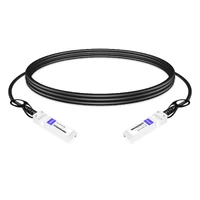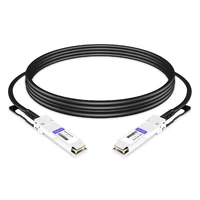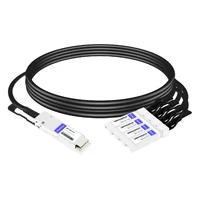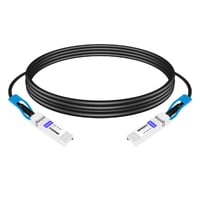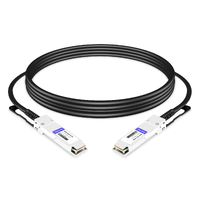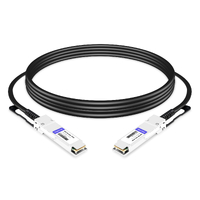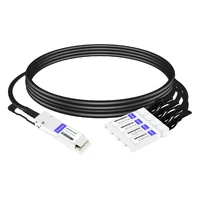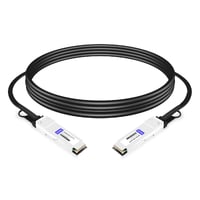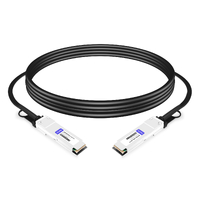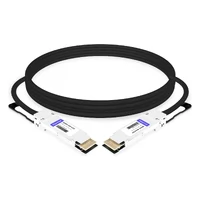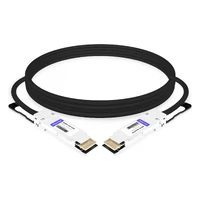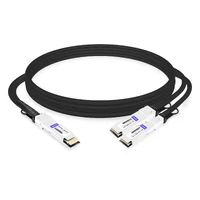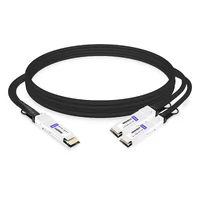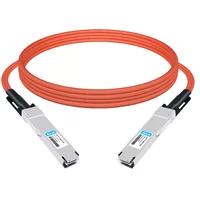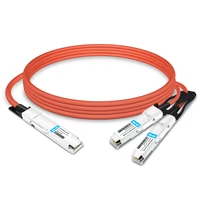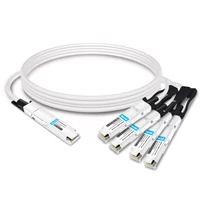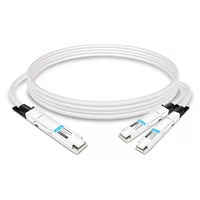Higher Ethernet speed, cloud computing, IoT, and virtual data centers demand more on operators of data centers. However, DAC cable still maintains its market position not just within data centers but within wider areas of the industry due to its cost efficiency and high performance for data center interconnection. This passage tends to introduce the common DAC cables and their applications for high-density high-speed gigabit ethernet interconnects in data centers.
Table of Contents
ToggleWhat is a Direct Attach Cable(DAC)?
DAC is an acronym for Direct Attach Cable, which is generally called direct cable, direct copper cable, or high-speed cable. High-speed cable is a kind of low-cost short-distance connection solution to replace optical modules. Both of its ends have cable assemblies of a module, which are connected to fixed ports only. Besides, the module head and copper can not be separated. However, compared with active optical cables, the connector modules on high-speed cables require no expensive optical lasers and other electronic components. Therefore, both cost and power consumption are saved for short-distance connections.
Is DAC Copper or Fiber?
DAC cables are made from shielded Twinax copper coaxial and are factory equipped with modules on either end connected to fixed ports. The modules cannot be removed from the cable. Therefore, all DAC cables are produced at a fixed length. The high-speed copper cable has excellent attenuation performance, low latency, and anti-interference in high-frequency broadband transmission.
What is Twinax Cable Used For?
Direct attached Twinax cable can be widely used in data center interconnection such as SATA storage devices, RADI systems, core routers, core switches, servers for 10G/40G/100G Ethernet, and InfiniBand. Generally speaking, this direct attach copper cable provides a cost-effective and high-performance solution for the following situations:
• Top of Rack(ToR)/Adjacent Rack – Either passive or active DAC cable is perfect for shorter ToR or rack-to-rack operations with cost-effective budgets.
• Middle of Row – Active DACs may be a better solution in this application, as long as the transmission distance is less than 15m.
• End of Row – DAC cables are ideal for the end of row architectures as long as the distance is within the 15 meters limit.
What Is The Difference Between Active And Passive DAC Cables?
The main difference between an active DAC cable and a passive DAC cable is whether the signal processing is done or not. If there is an electrical component for signal conditioning in the cable, it is an “Active DAC”. If not, it is a “Passive DAC”, since it does not apply electronics for signal conditioning. Apart from the inner component, active and passive DAC cables also differ from each other in link length. A passive DAC Twinax cable transmits an Ethernet signal over a short length (0.5 m-5 m), while an active DAC Twinax cable supports a transmission distance of 5 m-10 m for an Ethernet signal.
9 Most Common DAC Cables
10G SFP+ to SFP+ DAC
10G SFP + to SFP+ DAC adopts passive dual-axis cable assemblies and is directly connected to the SFP + module. It has the characteristics of high density, low power, low cost, and low delay.
What are the types of 10G SFP + to SFP + high-speed cables? Generally speaking, there are three different 10G + to SFP + high-speed twisted pair cables, i.e. 10G SFP + passive copper core high-speed cable (DAC), 10G SFP + active copper core high-speed cable (ACC), 10G SFP + active optical cable (AOC). They are suitable for Ethernet network connectivity within the rack and between adjacent racks, which can save costs significantly.
10G SFP+ passive copper direct attach cable provides a direct electrical connection interface between the two ends of the corresponding cable, and the transmission distance can reach 12m. However, due to the heavy weight of the cable and considering the signal integrity, the length of the cable is generally limited for the connection within the range of 7m to 10m.
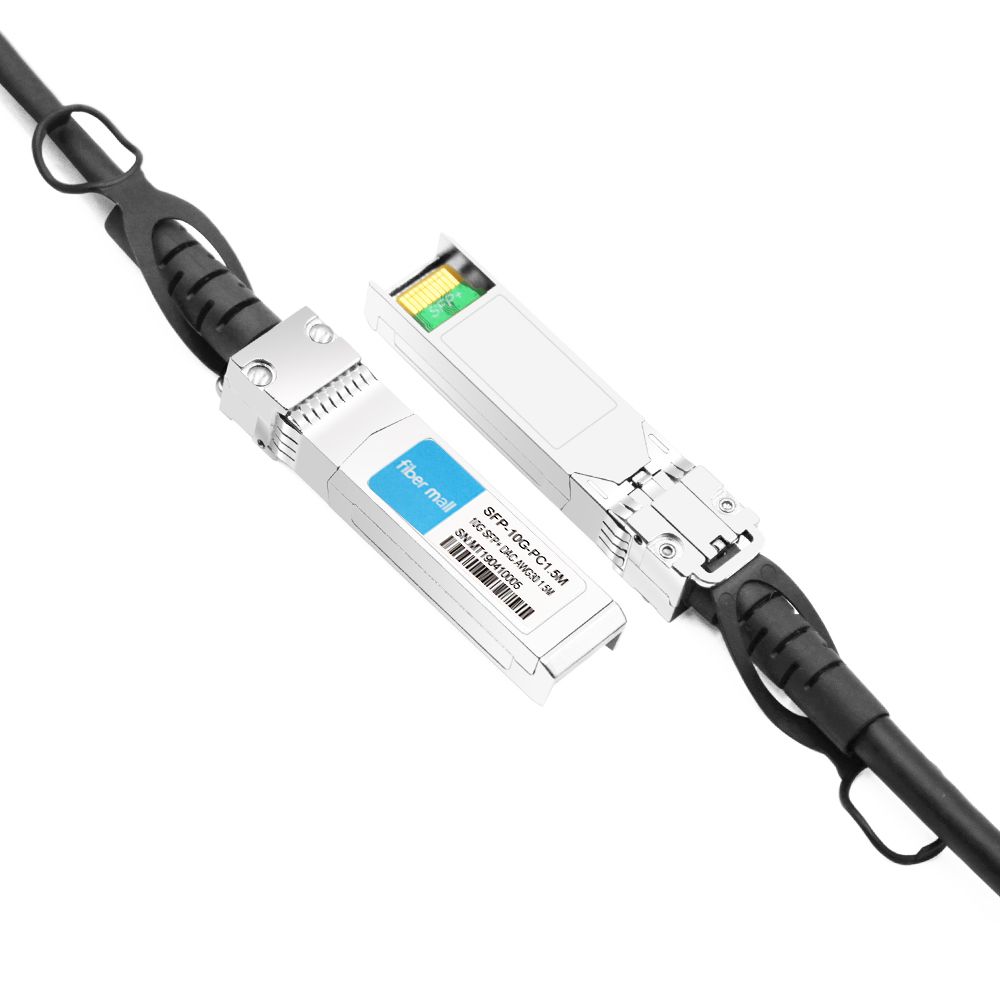
SFP 10G Direct Attach Copper Passive Cable 1m-FiberMall
10G XFP to SFP+ DAC
10G XFP to SFP+ DAC is a twin-ax direct attach copper cable assembly with a 10G XFP interface on one end and a 10G SFP+ interface on the other. Since the XFP optical module does not have the standard DAC copper cable, the signal compensation transmitted by the equipment is low, and the loss of the cable itself is large. Thus it can only transmit over a short distance, generally within 5m, to realize the data connectivity between 10G SFP+ interface and 10G XFP port.
Product Details
|
FiberMall P/N |
XFP-SFP-10G-PC5M |
Vendor Name |
FIBER MALL |
|
Connector |
XFP to SFP+ |
Max Data Rate |
10Gbps |
|
Cable Length |
5m (16.4ft) |
AWG |
AWG 24 |
|
Jacket Material |
PVC (OFNR) |
Minimum Bend Radius |
31.5mm |
|
Operation Temperature |
0~ 70 °C (32 to 158°F) |
Protocols |
1x InfiniBand QDR, DDR, SDR, |
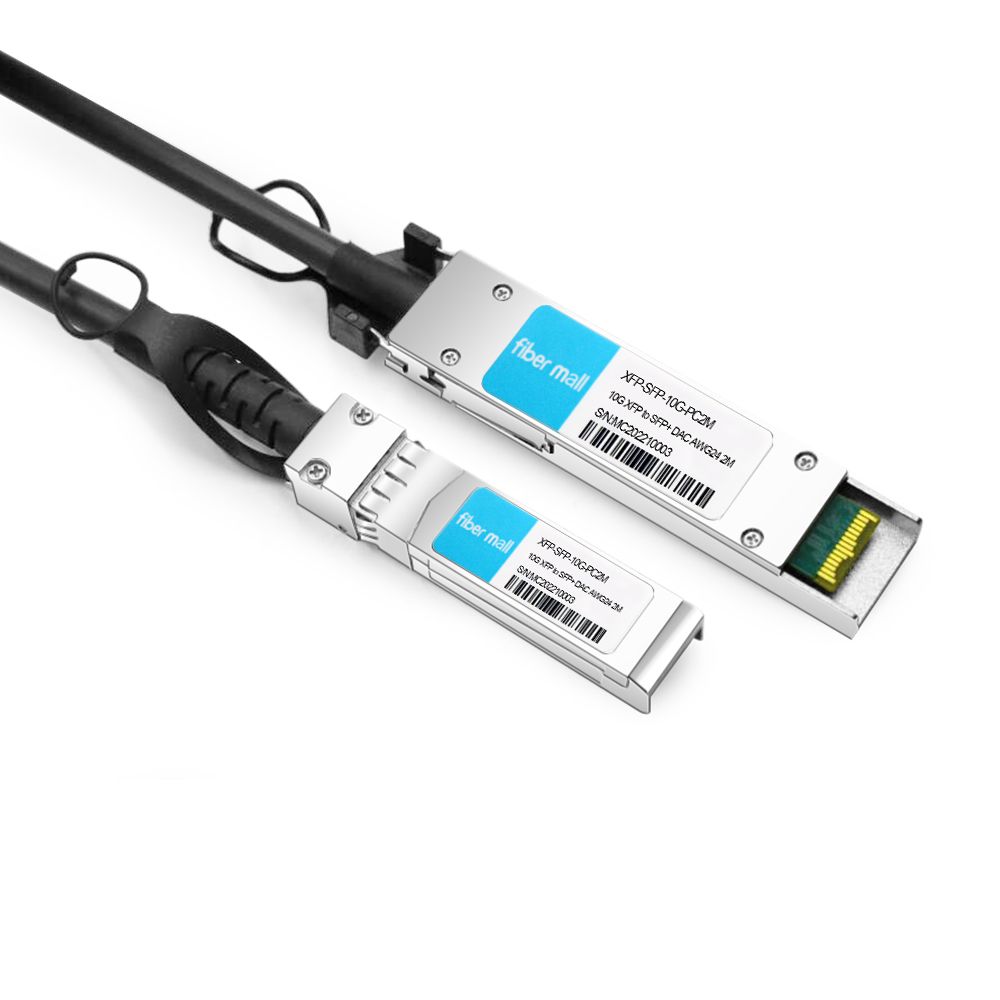
FiberMall 10G XFP to SFP+ DAC Passive Copper Cable 2m
40G QSFP+ to QSFP+ DAC
40g QSFP + to QSFP + DAC is a high-speed direct attach copper cable consisting of two 40G QSFP+ fiber transceivers and copper core, used for interconnection between 40G QSFP+ ports to 40G QSFP+ port with a transmission distance less than 7m.
40G QSFP+ to QSFP+ Direct Attach Cable provides a cost-effective way to establish a 40G connection between internal racks and cross-rack with QSFP+ switching ports, which increases the Ethernet network interconnection between the access layer uplink and the trunk link up to 40G / 100G. With its high speed and low latency, it is widely connected to high-speed backbone networks, enterprise network switching, and network storage. 40G QSFP + to QSFP + DAC is one of the most applied types among the portfolio of 40G DAC.
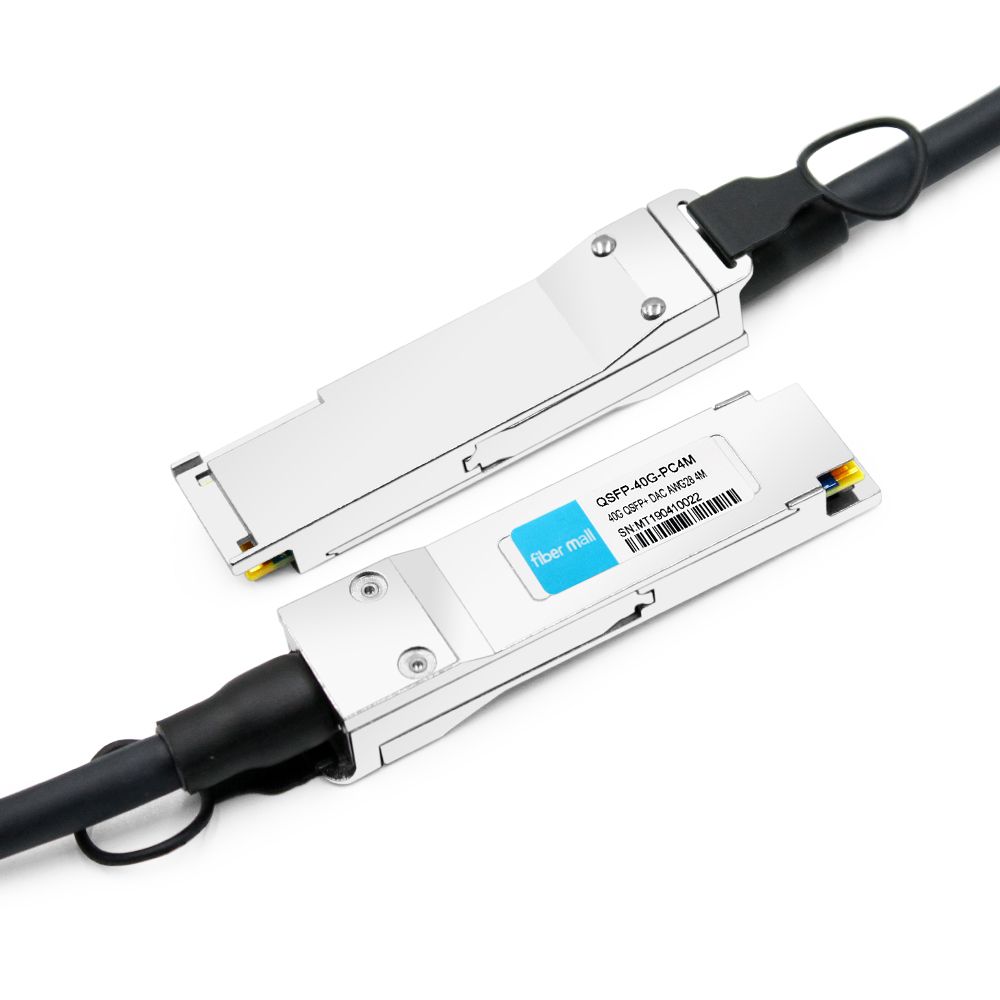
FiberMall QSFP Cable-40G QSFP+ to QSFP+ DAC Passive 4m
40G QSFP+ to 4×SFP+ DAC
40G QSFP+ to 4×SFP+ DAC consists of one 40G QSFP+ fiber transceiver, copper core, and four 10G SFP+ fiber transceiver. One of its ends has the 40G QSFP+ port conforming to SFF-8436 requirements. The other end has four 10G SFP+ ports conforming to SFF-8432 requirements. It connects 40G and 10G equipment (NIC/HBA/CAN, switch, and server) within 7m according to the client’s requirement for the cable length. At present, it is the best option for the exchange of switch ports in an economical and simple way.
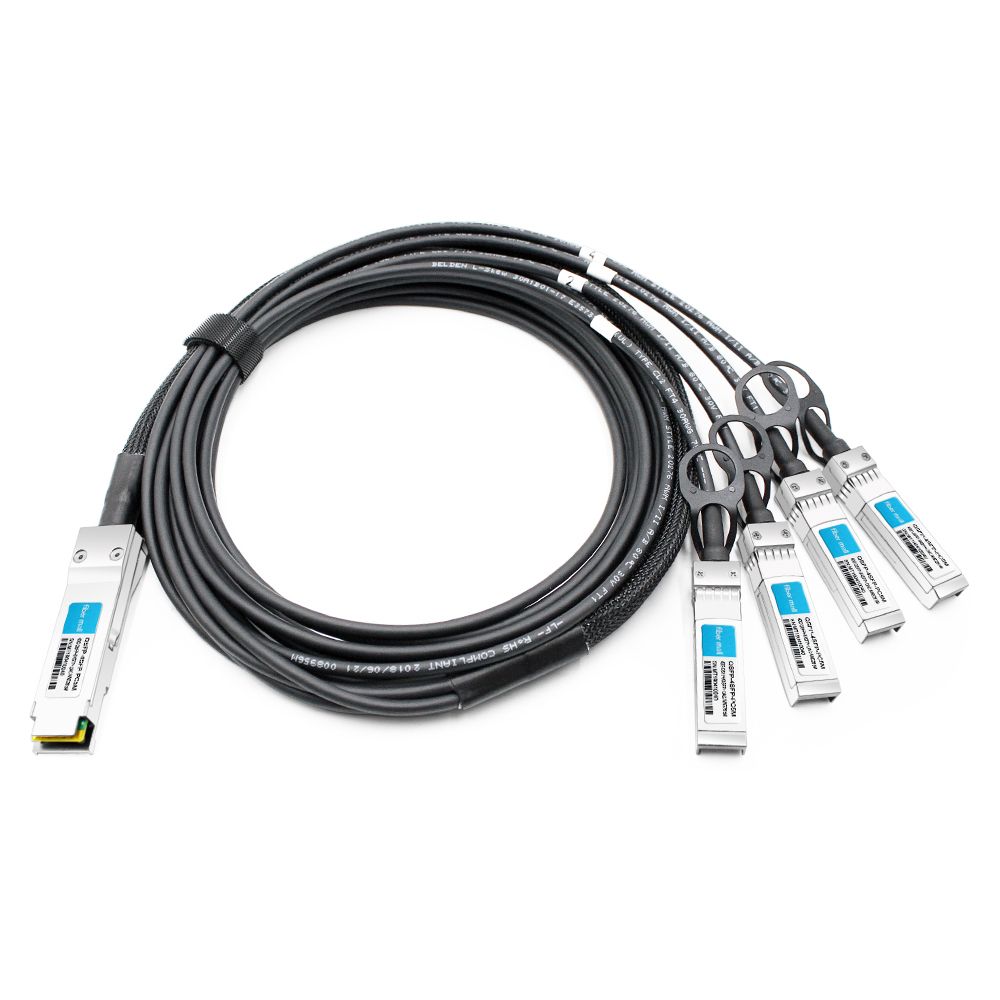
FiberMall 40G QSFP+ to 4×SFP+ Direct Attach Copper Cable
40GQSFP+ to 4 XFP DAC
40G QSFP+ to 4 XFP direct attach copper cable assemblies consists of one 40G QSFP+ fiber transceiver, copper core, and four 10G XFP fiber transceivers. As the XFP fiber transceiver has no DAC copper standard, has low signal compensation provided by a device and the loss of the cable is heavy, it is only used for data transfer within a short distance of 2m and interconnection between the available 40G QSFP+ port and four XFP ports.
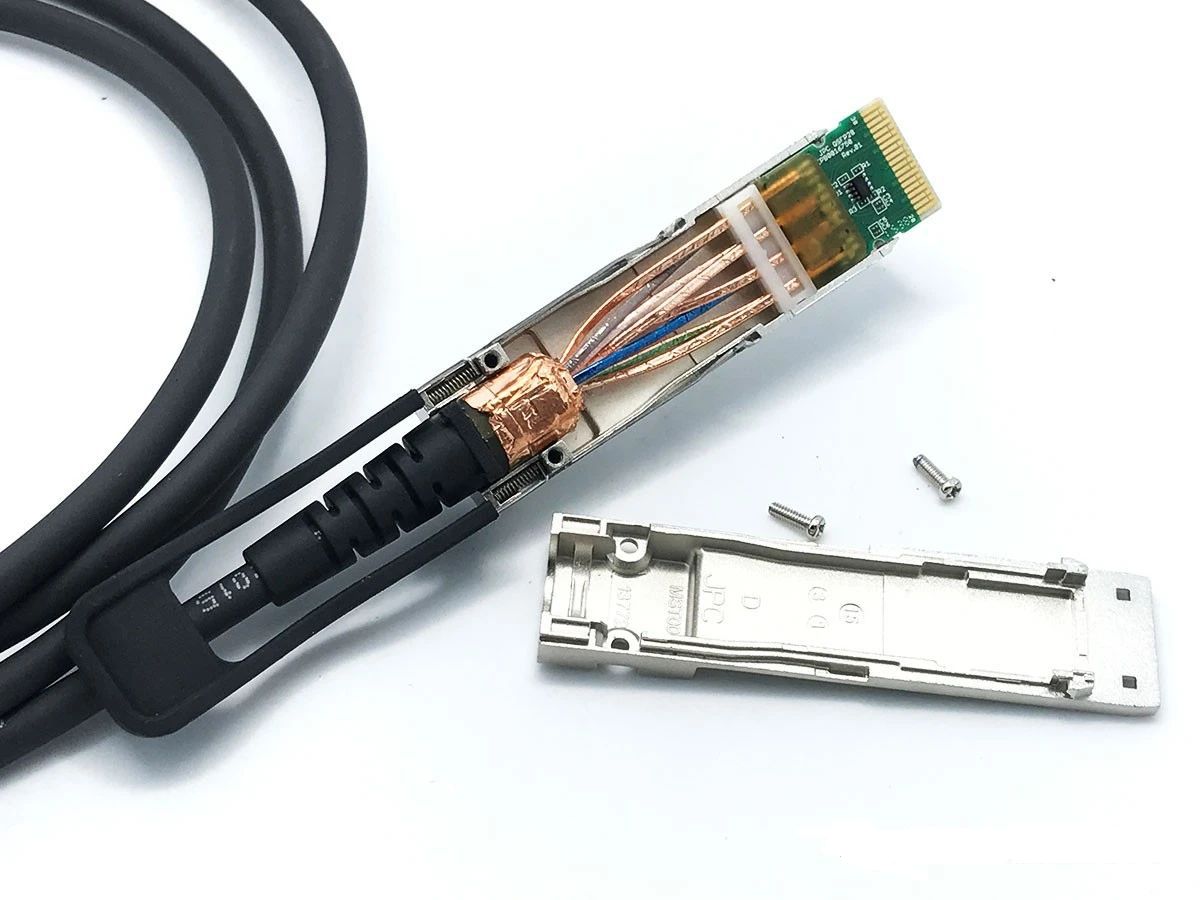
FiberMall 40G QSFP+ to 4 XFP DAC Twinax Cable
25G SFP28 to SFP28 DAC
25G SFP28 to SFP28 DAC can provide customers with 25G high bandwidth Ethernet network interconnection capability. Conforming to IEEE p802.3by Ethernet standard and sff-8402 SFP28, it is widely used in data center or Super-computing Center system scenarios.
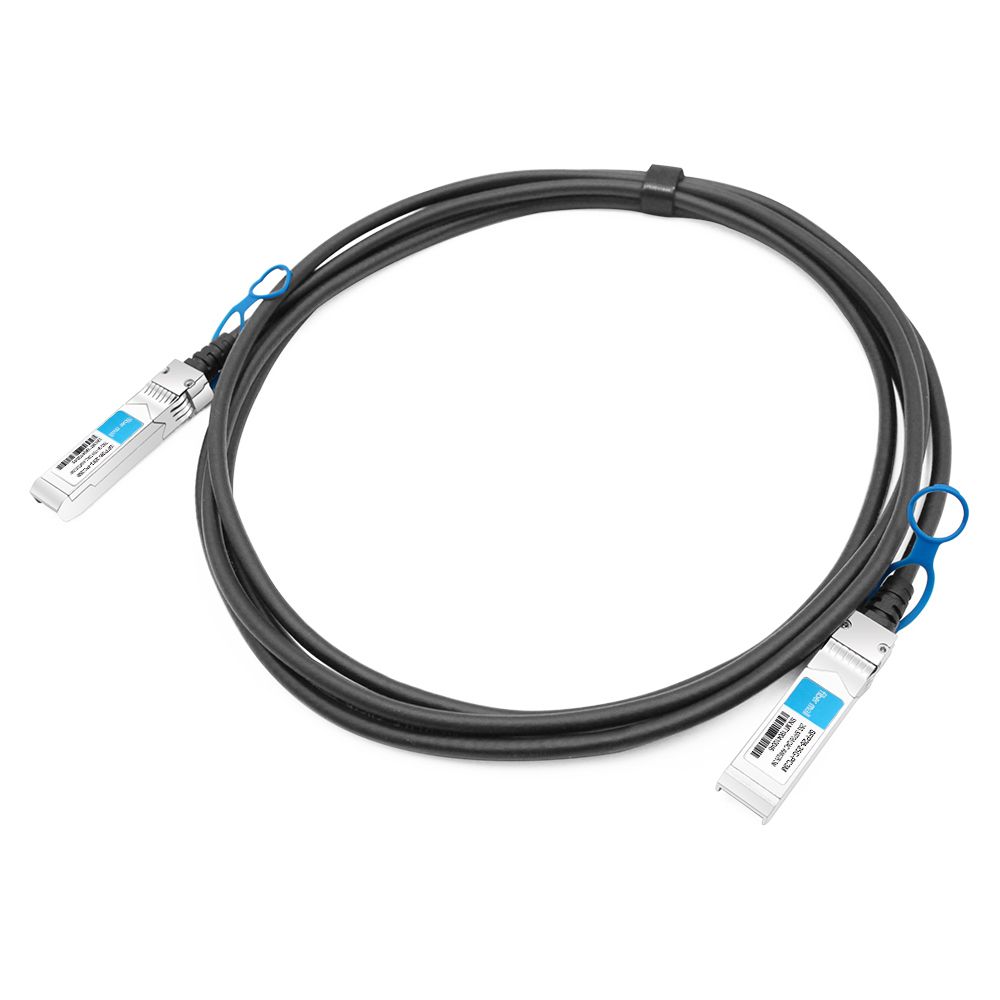
FiberMall 25G SFP28 to SFP28 Direct Attach Cable
100G QSFP28 to QSFP28 DAC
100G QSFP28 to QSFP28 DAC provides data interconnection through 100G bandwidth and 4x duplex channels. Compliant with SFF-8436 Standard, every channel supports 25Gb/s rate and 100 Gb/s of bandwidth aggregation and is applied for Ethernet network connection between equipment with QSFP28 ports.
100G QSFP28 to 4×SFP28 DAC
One end of 100G QSFP28 to 4×SFP28 DAC has a 100G QSFP28 port, and the other end has four 25G SFP28 ports. Compliant with SFF-8665/SFF-8679、IEEE 802.3bj and Infiniband EDR Standard, it provides data interconnection through 100G bandwidth and is widely applied for system scenarios at data centers or HPC centers.
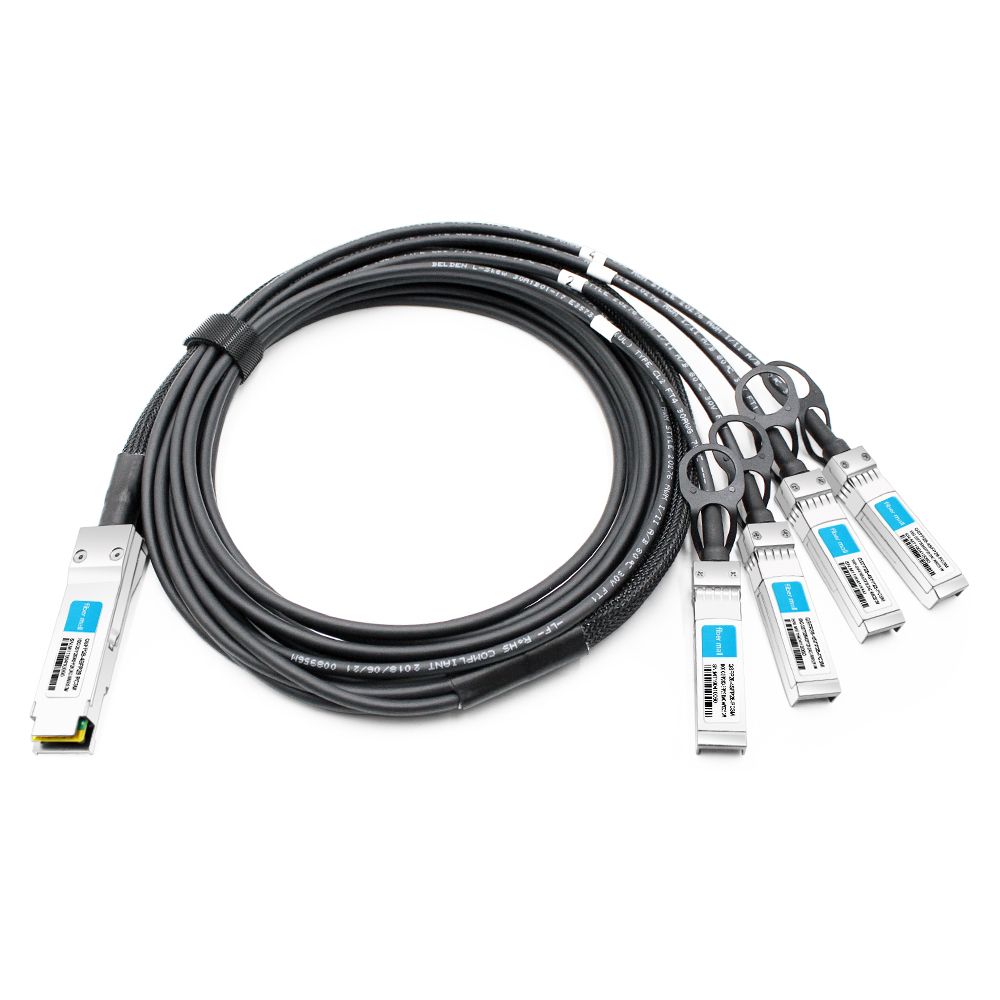
FiberMall 100G QSFP28 to 4×SFP28 Passive 3m Twinax Network DAC Cable
56G QSFP+ to QSFP+ DAC
The 56G QSFP+ to QSFP+ DAC is an inexpensive copper twin-ax cable with QSFP+ connectors on both sides and provides 56 Gigabit Ethernet connectivity between devices with QSFP+ ports. This direct attach high-speed cable is perfect for very short distances and offers a highly cost-effective way to establish a 56 Gigabit connectivity. In compliance with InfiniBand FDR and QSFP+ Multi-Source Agreement (MSA) standards SFF-8436, it is designed for 56G (14Gx4) interconnecting networking applications such as high-performance computing (HPC), enterprise networking including top-of-rack switching, and network storage markets.
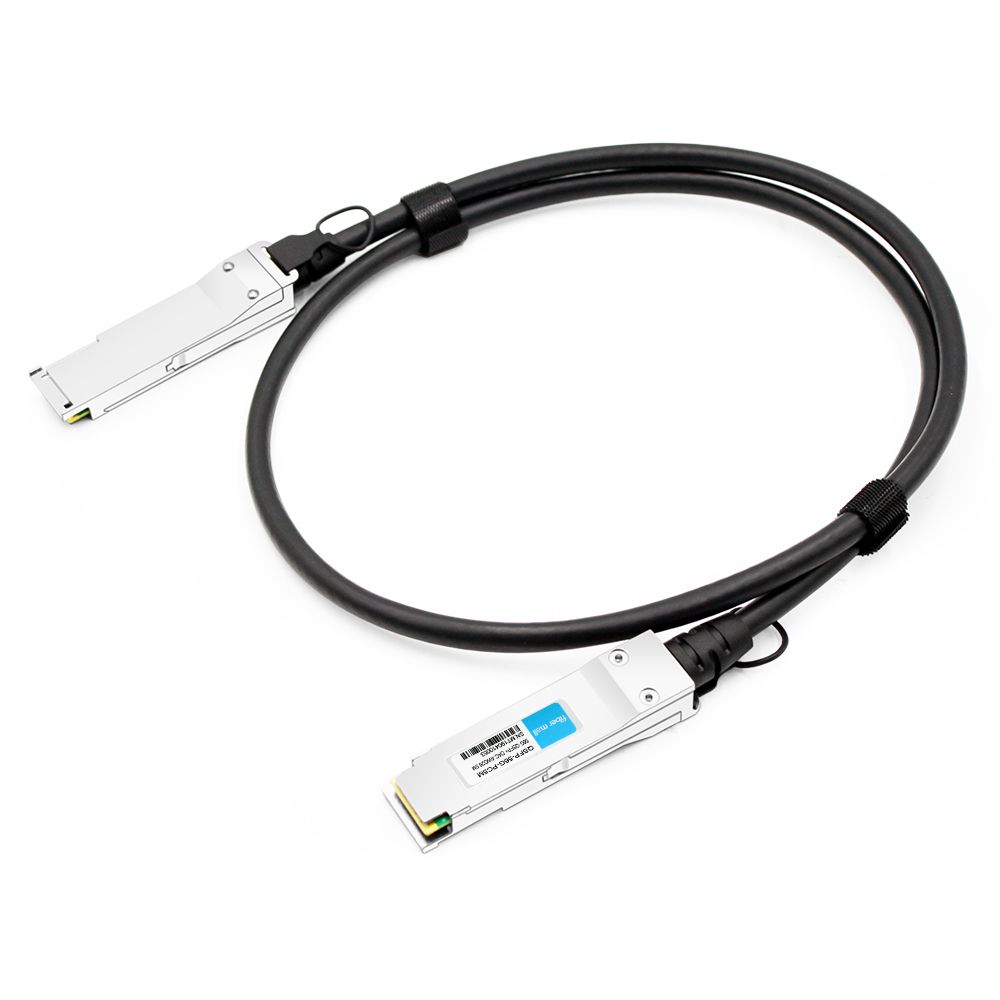
FiberMall 56G QSFP+ to QSFP+ Copper Direct Attach Cable 1m (3ft)
200G QSFP56 to QSFP56 DAC
The 200G QSFP56 Active Direct Attach Copper Twinax Cable is designed for use in 200GBASE Ethernet. They are suitable for very short links and Improve network efficiency for data center server and storage connections. This cable is compliant with IEEE 802.3cd by Ethernet standard and QSFP MSA Compliant. FiberMall 200G QSFP56 DAC Cable, used in 200G Ethernet, InfiniBand HDR, data center, and storage area network.
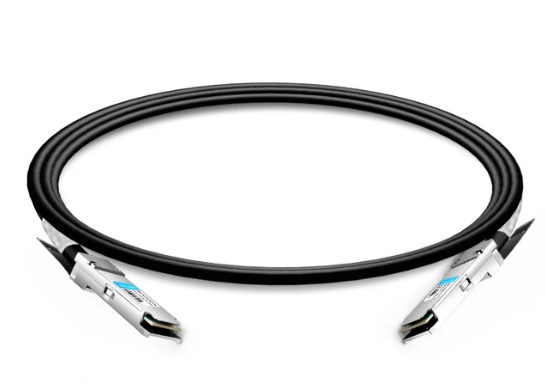
400G QSFP-DD to QSFP-DD DAC
400G QSFP-DD passive copper cable assembly feature eight differential copper pairs, providing four data transmission channels at speeds up to 56Gbps(PAM4) per channel and meets 400G Ethernet and InfiniBand Enhanced Data Rate(EDR) requirements. Available in a broad range of wire gages-from 28AWG through 30AWG-this 400G copper cable assembly features low insertion loss and low cross talk.
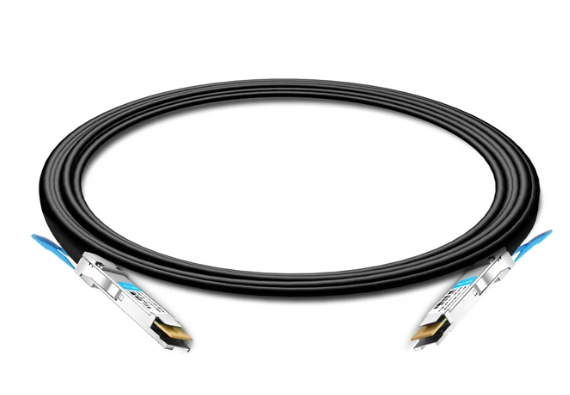
400G QSFP112 to QSFP112 ACC
400G QSFP112 ACC is an active direct attach copper cable designed for intra-rack or inter-rack interconnects in data centers. It complies with IEEE 802.3ck 400GBASE-CR4 Ethernet transmission protocol and is also compatible with InfiniBand NDR transmission protocol. QSFP112 is a cost-effective way to upgrade intra data center network bandwidth while keeping the network architecture physically and logically the same from 200G to 400G.
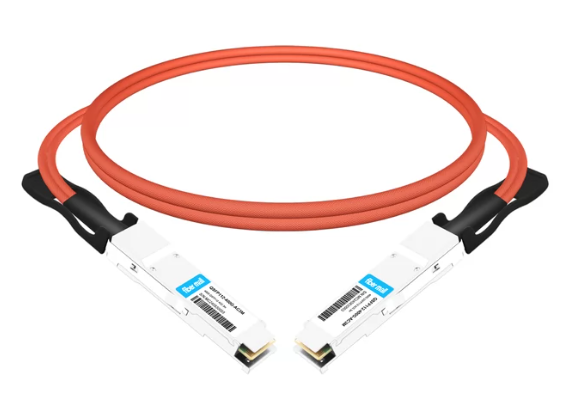
400G NDR OSFP to OSFP DAC
The FiberMall P/N OSFP-FLT-400G-PC1M is an OSFP to OSFP PAM4 Direct Attach Cable 28AWG that can connect two NVIDIA ConnectX-7 400G OSFP NICs with a 400G OSFP Flat-top DAC. It has a maximum data rate of 400Gb/s and an OSFP FLT to OSFP FLT connector.
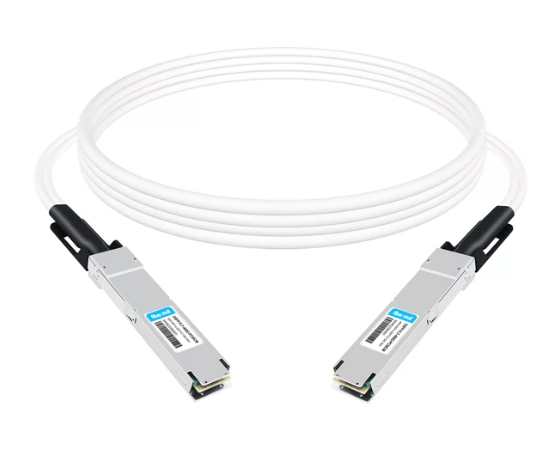
800G OSFP to OSFP ACC
800G OSFP to OSFP ACC (Active Copper Cable) is a high-speed link that can provide reliable connectivity for data centers in demanding environments. It’s the second lowest-cost, lowest-latency, and very low-power-consuming link available.
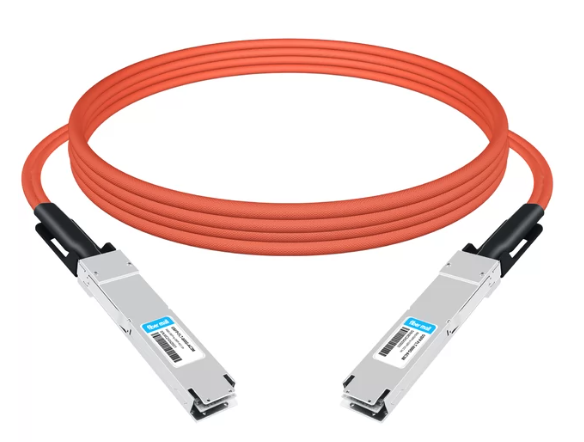
200G QSFP56 to 2x100G QSFP56 Breakout DAC
200G QSFP56 to 2x 100G QSFP56 Breakout AOC (Active Optical Cable) assemblies are designed to support 200G/2x100G Ethernet and InfiniBand HDR/HDR100. This breakout cable is compliant with IEEE 802.3cd, SFF-8665, and QSFP56 MSA standards. It provides a connection of a 200G QSFP56 port on one end and to two 100G QSFP56 ports on the other end and is suitable for data center and HPC (High-Performance Computing) links up to 70m (OM3) or 100m (OM4/OM5).
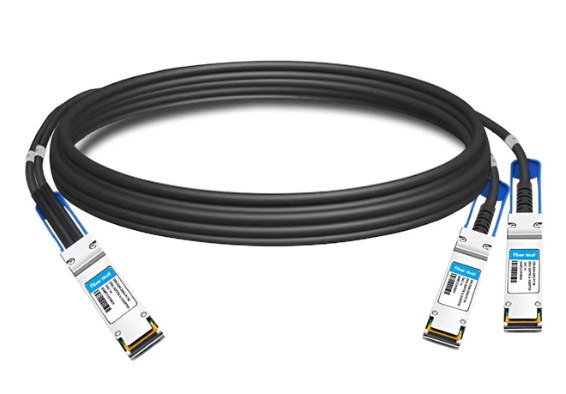
400G OSFP to 2x200G OSFP DAC
400G OSFP to 2x200G QSFP56 Breakout Direct Attach Copper Cable provide reliable connectivity for data centers in demanding environments. It’s the second lowest-cost, lowest-latency, and very low-power consuming link available.
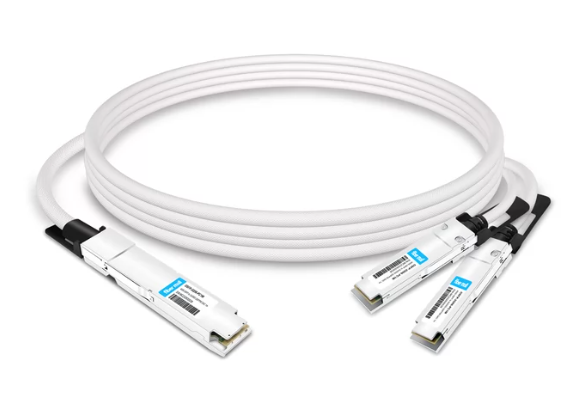
800G Infiniband NDR Twin-port OSFP to 4x200G QSFP112 DAC
An 800G twin-port OSFP to 4x200G QSFP112 InfiniBand NDR (Non-Data Rate) breakout DAC (Direct Attach Copper) cable is a passive copper cable that allows breaking out a single 800 Gigabit per second (800G) OSFP port into four 200 Gigabit per second (200G) QSFP112 ports for InfiniBand connectivity.
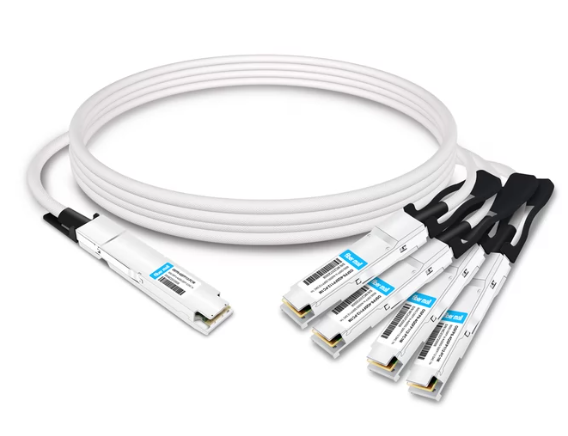
Performance and Specifications
DAC cables deliver robust performance across various speeds, but their specifications vary by generation and type. FiberMall’s DAC lineup is optimized for high-bandwidth applications in AI-driven networks.
How Far Do DACs Reach?
DAC cables are designed for short distances, typically up to 5m at speeds above 100GbE, with passive versions limited to even shorter runs (e.g., 3m) and active ones extending slightly further. Reach depends on speed and cable gauge; for instance, 10GbE DACs can go up to 10m, but higher speeds reduce this due to signal attenuation. Beyond these limits, fiber optics or Active Optical Cables (AOCs) are recommended. FiberMall offers DACs with precise length options to match your deployment needs.
| Cable Types | Model | Length | Connector |
| SFP+ to SFP+ DAC | SFP-10G-PC1M | 1M | SFP+ |
| SFP-10G-PC3M | 3M | SFP+ | |
| SFP-10G-PC5M | 5M | SFP+ | |
| SFP-10G-AC7M | 7M | SFP+ | |
| SFP-10G-AC10M | 10M | SFP+ | |
| QSFP+ to QSFP+ DAC | QSFP-40G-PC1M | 1M | QSFP+ |
| QSFP-40G-PC3M | 3M | QSFP+ | |
| QSFP-40G-PC5M | 5M | QSFP+ | |
| QSFP+ to 4*SFP+ DAC | QSFP-4SFP-PC1M | 1M | QSFP+ to 4*SFP |
| QSFP-4SFP-PC3M | 3M | QSFP+ to 4*SFP | |
| QSFP-4SFP-PC5M | 5M | QSFP+ to 4*SFP | |
| QSFP28 to QSFP28 DAC | QSFP28-100G-PC1M | 1M | QSFP28 |
| QSFP28-100G-PC3M | 3M | QSFP28 | |
| QSFP28-100G-PC5M | 5M | QSFP28 | |
|
SFP28 to SFP28 DAC | SFP28-25G-PC1M | 1M | SFP28 |
| SFP28-25G-PC3M | 3M | SFP28 | |
| SFP28-25G-PC5M | 5M | SFP28 | |
| SFP28-25G-AC10M | 10M | SFP28 | |
| QSFP28 to 4*SFP28 DAC | QSFP28-4SFP28-PC1M | 1M | QSFP28 to 4*SFP28 |
| QSFP28-4SFP28-PC3M | 3M | QSFP28 to 4*SFP28 | |
| QSFP28-4SFP28-PC5M | 5M | QSFP28 to 4*SFP28 | |
| 200G QSFP56 to QSFP56 DAC | QSFP56-200G-PC1M | 1M | 200G QSFP56 to QSFP56 |
| QSFP56-200G-PC2M | 2M | 200G QSFP56 to QSFP56 | |
| QSFP56-200G-PC3M | 3M | 200G QSFP56 to QSFP56 | |
| 400G QSFP-DD to QSFP-DD DAC | QSFPDD-400G-PC1M | 1M | 400G QSFP-DD to QSFP-DD |
| QSFPDD-400G-PC2M | 2M | 400G QSFP-DD to QSFP-DD | |
| QSFPDD-400G-PC3M | 3M | 400G QSFP-DD to QSFP-DD | |
| 400G QSFP112 to QSFP112 ACC | QSFP112-400G-PC1M | 1M | 400G QSFP112 to QSFP112 |
| QSFP112-400G-PC3M | 3M | 400G QSFP112 to QSFP112 | |
| QSFP112-400G-PC5M | 5M | 400G QSFP112 to QSFP112 | |
| 400G NDR OSFP to OSFP DAC | OSFP-FLT-400G-PC1M | 1M | 400G NDR OSFP to OSFP |
| OSFP-FLT-400G-PC2M | 2M | 400G NDR OSFP to OSFP | |
| OSFP-FLT-400G-PC3M | 3M | 400G NDR OSFP to OSFP | |
| 800G OSFP to OSFP ACC | OSFP-FLT-800G-AC3M | 3M | 800G OSFP to OSFP |
| 200G QSFP56 to 2x100G QSFP56 Breakout DAC | Q56-2Q56-200G-PC1M | 1M | 200G QSFP56 to 2x100G QSFP56 |
| Q56-2Q56-200G-PC2M | 2M | 200G QSFP56 to 2x100G QSFP56 | |
| Q56-2Q56-200G-PC3M | 3M | 200G QSFP56 to 2x100G QSFP56 | |
| 400G OSFP to 2x200G QSFP56 DAC | OSFP-2Q56-PC1M | 1M | 400G OSFP to 2x200G QSFP56 |
| OSFP-2Q56-PC2M | 2M | 400G OSFP to 2x200G QSFP56 | |
| OSFP-2Q56-PC3M | 3M | 400G OSFP to 2x200G QSFP56 | |
| 800G InfiniBand NDR Twin-port OSFP to 4x200G QSFP112 DAC | OSFP8-4OSFP2-PC1M | 1M | 800G InfiniBand NDR Twin-port OSFP to 4x200G QSFP112 |
| OSFP8-4OSFP2-PC2M | 2M | 800G InfiniBand NDR Twin-port OSFP to 4x200G QSFP112 | |
| OSFP8-4OSFP2-PC3M | 3M | 800G InfiniBand NDR Twin-port OSFP to 4x200G QSFP112 |
10GbE/40GbE Generation DACs
The 10GbE/40GbE generation includes SFP+ to SFP+ for 10GbE links and QSFP+ to QSFP+ for 40GbE, with breakout options like QSFP+ to 4x SFP+. These are foundational for legacy high-speed networks, offering reliable performance in data centers. FiberMall’s compatible DACs ensure backward compatibility for smooth upgrades.
25GbE/50GbE/100GbE Generation DACs
This generation supports SFP28 to SFP28 for 25GbE, QSFP28 to QSFP28 for 50GbE/100GbE, and breakouts like QSFP28 to 4x SFP28. They cater to modern demands for higher throughput in cloud and AI environments. FiberMall provides these advanced DACs with enhanced shielding for minimal interference.
Selecting the Right DAC
Choosing the appropriate DAC involves evaluating speed, compatibility, and application. FiberMall’s experts can guide you through the selection process.
What Kind of DAC Should You Look For?
Prioritize speed compatibility (e.g., 100GbE), vendor interoperability, and type (passive/active, standard/breakout). Look for MSA-compliant cables with good EMI shielding and tested reliability. FiberMall’s DAC cables meet these criteria, offering cost-effective, high-quality options for your network.
Why Choose DAC Cables Over Optical Transceivers?
1. High performance: DAC is suitable for short-distance wiring of the data center with its strong exchangeability of integration scheme;
2. Energy saving and environmental protection: The internal material of the high-speed cable is copper, which has a good natural heat dissipation effect and the qualities of energy-saving and environmental protection;
3. Low power consumption: Since the passive cable does not need power, the power consumption is almost 0.
4. Low cost: Copper cables are much cheaper than fiber, so using high-speed cables can greatly reduce the wiring costs of the entire data center.
In conclusion
In the era of the rapid development of data centers and connection data, DAC greatly expands its market and has gained a large share of the IDC market. As data speed is getting close to 400G at data centers, DAC high-speed cable products are applied by more and more clients as it has the qualities of cost-effectiveness, high rates, and low loss. At the same time, quite a lot of high-speed data centers also prefer DAC products when considering communications solutions.
Frequently Asked Questions (FAQ)
How Do DAC Cables Compare to Fiber Optics for Longer Distances?
DAC cables are limited to short distances (up to 10m for 10G), suffering from signal loss over length, while fiber optics excel for longer runs (e.g., 100m+ for multimode, km for single-mode) with minimal attenuation. DAC offers lower latency and cost but requires fiber for extended reach.
What Factors Affect DAC Cable Pricing and Availability?
Pricing and availability are influenced by length, speed (higher speeds cost more), type (active vs. passive), manufacturer compatibility, and market demand. Supply chain issues and raw material costs (e.g., copper) also play a role.
Are There Any Compatibility Issues with Different Generations of DAC Cables?
Yes, compatibility issues can arise between generations, such as firmware restrictions in switches (e.g., Fortinet upgrades affecting DAC functionality) or mismatched speeds/connectors. Always verify vendor support; FiberMall ensures broad compatibility in our DAC products.
Related Products:
-
 SFP-10G-PC2M 2m (7ft) 10G SFP+ to SFP+ Passive Direct Attach Copper Cable
$10.00
SFP-10G-PC2M 2m (7ft) 10G SFP+ to SFP+ Passive Direct Attach Copper Cable
$10.00
-
 QSFP-40G-PC7M 7m (23ft) 40G QSFP+ to QSFP+ Passive Copper Direct Attach Cable
$65.00
QSFP-40G-PC7M 7m (23ft) 40G QSFP+ to QSFP+ Passive Copper Direct Attach Cable
$65.00
-
 QSFP-40G-AC2M 2m (7ft) 40G QSFP+ to QSFP+ Active Twinax Copper Direct Attach Cable
$130.00
QSFP-40G-AC2M 2m (7ft) 40G QSFP+ to QSFP+ Active Twinax Copper Direct Attach Cable
$130.00
-
 QSFP-4SFP-PC2M 2m (7ft) 40G QSFP+ to Four 10G SFP+ Copper Direct Attach Breakout Cable
$40.00
QSFP-4SFP-PC2M 2m (7ft) 40G QSFP+ to Four 10G SFP+ Copper Direct Attach Breakout Cable
$40.00
-
 SFP28-25G-PC1M 1m (3ft) 25G SFP28 to SFP28 Passive Direct Attach Copper Cable
$18.00
SFP28-25G-PC1M 1m (3ft) 25G SFP28 to SFP28 Passive Direct Attach Copper Cable
$18.00
-
 QSFP-56G-PC2M 2m (7ft) 56G QSFP+ to QSFP+ Copper Direct Attach Cable
$35.00
QSFP-56G-PC2M 2m (7ft) 56G QSFP+ to QSFP+ Copper Direct Attach Cable
$35.00
-
 QSFP28-100G-PC5M 5m (16ft) 100G QSFP28 to QSFP28 Copper Direct Attach Cable
$60.00
QSFP28-100G-PC5M 5m (16ft) 100G QSFP28 to QSFP28 Copper Direct Attach Cable
$60.00
-
 QSFP28-4SFP28-PC3M 3m (10ft) 100G QSFP28 to Four 25G SFP28 Copper Direct Attach Breakout Cable
$80.00
QSFP28-4SFP28-PC3M 3m (10ft) 100G QSFP28 to Four 25G SFP28 Copper Direct Attach Breakout Cable
$80.00
-
 QSFP56-200G-PC3M 3m (10ft) 200G QSFP56 to QSFP56 PAM4 Passive Direct Attach Copper Twinax Cable
$80.00
QSFP56-200G-PC3M 3m (10ft) 200G QSFP56 to QSFP56 PAM4 Passive Direct Attach Copper Twinax Cable
$80.00
-
 QSFP56-200G-PC1M 1m (3ft) 200G QSFP56 to QSFP56 PAM4 Passive Direct Attach Copper Twinax Cable
$50.00
QSFP56-200G-PC1M 1m (3ft) 200G QSFP56 to QSFP56 PAM4 Passive Direct Attach Copper Twinax Cable
$50.00
-
 QSFPDD-400G-PC2M 2m (7ft) 400G QSFP-DD to QSFP-DD PAM4 Passive Direct Attach Copper Twinax Cable
$110.00
QSFPDD-400G-PC2M 2m (7ft) 400G QSFP-DD to QSFP-DD PAM4 Passive Direct Attach Copper Twinax Cable
$110.00
-
 QSFPDD-400G-PC3M 3m (10ft) 400G QSFP-DD to QSFP-DD PAM4 Passive Direct Attach Copper Twinax Cable
$155.00
QSFPDD-400G-PC3M 3m (10ft) 400G QSFP-DD to QSFP-DD PAM4 Passive Direct Attach Copper Twinax Cable
$155.00
-
 QSFPDD-2QSFP56-400G-PC2M 2m (7ft) 400G QSFP-DD to 2x200G QSFP56 PAM4 Passive Breakout Direct Attach Copper Cable
$135.00
QSFPDD-2QSFP56-400G-PC2M 2m (7ft) 400G QSFP-DD to 2x200G QSFP56 PAM4 Passive Breakout Direct Attach Copper Cable
$135.00
-
 QDD-2Q56-400G-PC1M 1m (3ft) 400G QSFP-DD to 2x200G QSFP56 PAM4 Passive Breakout Direct Attach Copper Cable
$105.00
QDD-2Q56-400G-PC1M 1m (3ft) 400G QSFP-DD to 2x200G QSFP56 PAM4 Passive Breakout Direct Attach Copper Cable
$105.00
-
 NVIDIA MCA4J80-N003-FLT Compatible 3m (10ft) 800G Twin-port 2x400G OSFP to 2x400G OSFP InfiniBand NDR Active Copper Cable, Flat top on one end and Flat top on the other
$600.00
NVIDIA MCA4J80-N003-FLT Compatible 3m (10ft) 800G Twin-port 2x400G OSFP to 2x400G OSFP InfiniBand NDR Active Copper Cable, Flat top on one end and Flat top on the other
$600.00
-
 NVIDIA MCA7J65-N004 Compatible 4m (13ft) 800G Twin-port OSFP to 2x400G QSFP112 InfiniBand NDR Breakout Active Copper Cable
$800.00
NVIDIA MCA7J65-N004 Compatible 4m (13ft) 800G Twin-port OSFP to 2x400G QSFP112 InfiniBand NDR Breakout Active Copper Cable
$800.00
-
 NVIDIA MCP7Y40-N001 Compatible 1m (3ft) 800G InfiniBand NDR Twin-port OSFP to 4x200G QSFP112 Breakout DAC
$165.00
NVIDIA MCP7Y40-N001 Compatible 1m (3ft) 800G InfiniBand NDR Twin-port OSFP to 4x200G QSFP112 Breakout DAC
$165.00
-
 NVIDIA MCP7Y00-N001 Compatible 1m (3ft) 800Gb Twin-port OSFP to 2x400G OSFP InfiniBand NDR Breakout Direct Attach Copper Cable
$160.00
NVIDIA MCP7Y00-N001 Compatible 1m (3ft) 800Gb Twin-port OSFP to 2x400G OSFP InfiniBand NDR Breakout Direct Attach Copper Cable
$160.00

